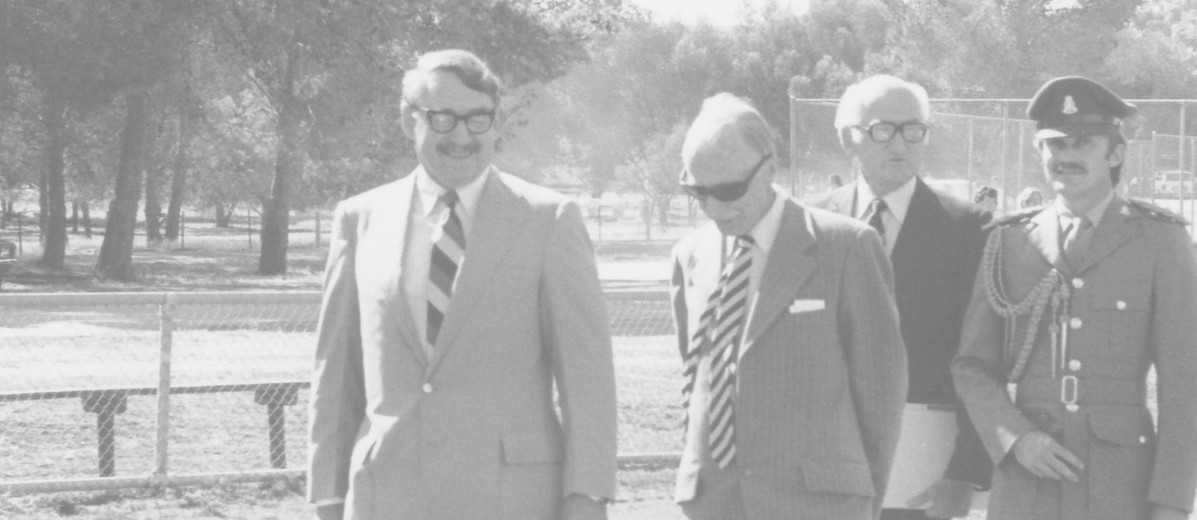Person
ContributeBorn at Silverton, New South Wales, on 25th March 1902, the son of grazier and farmer Robert Crocker and his wife Alma (née Bray), Walter Russell Crocker had a happy childhood in the Peterborough district, where he began a life-long love of the South Australian countryside and people. Much of his own life, however, has been lived in cities, including several of the world’s largest.
He attended school in Peterborough and then, planning to become an engineer, Adelaide’s Junior Technical College. At the University of Adelaide he changed to an arts course, after which, with a sound classical education and fine results, he entered Balliol College, Oxford, to read history and law. Later, at Stanford University, California, his interest in demography quickened. He visited Japan and wrote The Japanese Population Problem. Joining the British Colonial Service in 1930, he went to Northern Nigeria, discovering ‘the wonderful world of Africa’ and loving it. In outlook he had become an internationalist, fitting him for work in the International Labour Office in Geneva for six years from 1934, but his internationalism became clouded by pessimism as fascism rose in Europe. His awkward escape from a crumbling France in 1940 was the prelude to his war service and postings for intelligence work in the Gold Coast, Sierra Leone and the Congo. Much other travel followed. He became a lieutenant-colonel, with decorations including the Croix de Guerre and the Ordre du Lion. His appointment in 1946 as Chief of the Africa Section at the United Nations Secretariat in New York seemed almost predestined, though it also brought him some disillusionment with the workings of the United Nations and American materialist culture.
In 1950 he became the first professor of International Relations at the Australian National University, Canberra. He married Claire Ward in Canberra in 1951 and he had two sons. First asked to take a diplomatic posting in 1951, he served as High Commissioner or Ambassador in India (two separate terms), Nepal, Indonesia, Canada, the Netherlands, Belgium, East Africa and Italy, and undertook four special missions. These assignments allowed him to observe different societies and international leaders at close quarters but also inflicted certain trials (‘three thousand cocktail parties for my country’) as well as frustrations, such as Australia’s long refusal to recognize Communist China. On his diplomatic career he reflected: ‘I had no effect on Australian foreign policy; I had been naive in thinking that I could have. But they were eighteen years of absorbing interest.’ He was appointed C.B.E. in 1955.
He retired to his farm near Tarlee in 1970 but soon after moved to Adelaide. From 1973 to 1982 he was Lieutenant-Governor of South Australia, a position he much enhanced. He was knighted (K.B.E.) in 1978. His active mind was also applied as a member of the University of Adelaide’s Council, while his love of history and his home state made him a worthy patron of the Historical Society of South Australia. The same interests led him to write a biography of Sir Thomas Playford, adding to his earlier books on colonial affairs and India’s Jawaharlal Nehru. His more personal recollections were set down in Australian Ambassador and Travelling Back, books providing acute perceptions of an extraordinary range of people.
The vagaries of human behaviour both delighted and disenchanted him. Modern societies, often overpopulated, materialistic and prey to excesses, disturbed him and he lamented the increases in mass fashions and coarseness. For himself he preferred simpler living, enriched by the pleasures of good conversation, reading, walking and gardening. The label of ‘conservative’, however, fitted him awkwardly, for he often fearlessly espoused modern causes such as the protection of the environment.
Sir Walter Crocker is widely acknowledged as one of South Australia’s most distinguished sons. He died on 14th November 2002 and was buried at Navan Catholic Cemetery, Riverton.




CommentAdd new comment
Quickly, it's still quiet here; be the first to have your say!